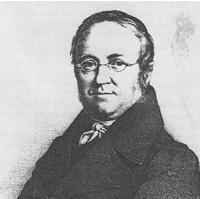Planning worship?
Check out our sister site, ZeteoSearch.org,
for 20+ additional resources related to your search.
- |
User Links
Search Results
Psalm 19: The heav'ns God's glory do declare
Meter: 8.6.8.6 Appears in 13 hymnals First Line: The heav'ns God's glory do declare Lyrics:
1The heav’ns God’s glory do declare,
the skies his hand-works preach:
2Day utters speech to day, and night
to night doth knowledge teach.
3There is no speech nor tongue to which
their voice doth not extend:
4Their line is gone through all the earth,
their words to the world’s end.
In them he set the sun a tent;
5Who, bridegroom-like, forth goes
From’s chamber, as a strong man doth
to run his race rejoice.
6From heav’n’s end is his going forth,
circling to th’ end again;
And there is nothing from his heat
that hidden doth remain.
7God’s law is perfect, and converts
the soul in sin that lies:
God’s testimony is most sure,
and makes the simple wise.
8The statutes of the Lord are right,
and do rejoice the heart:
The Lord’s command is pure, and doth
light to the eyes impart.
9Unspotted is the fear of God,
and doth endure for ever:
The judgments of the Lord are true
and righteous altogether.
10They more than gold, yea, much fine gold,
to be desired are:
Than honey, honey from the comb
that droppeth, sweeter far.
11Moreover, they thy servant warn
how he his life should frame:
A great reward provided is
for them that keep the same.
12Who can his errors understand?
O cleanse thou me within
13From secret faults. Thy servant keep
from all presumptuous sin:
And do not suffer them to have
dominion over me:
Then, righteous and innocent,
I from much sin shall be.
14The words which from my mouth proceed,
the thoughts sent from my heart,
Accept, O Lord, for thou my strength
and my Redeemer art.
Scripture: Psalm 19
Psalm 19: The heav'ns God's glory do declare
The heavens God's glory do declare
Hymnal: The Irish Presbyterian Hymnbook #P19a (2004) Meter: 8.6.8.6 Lyrics: 1 The heavens God’s glory do declare,
the skies his hand-works preach:
2 day utters speech to day, and night
to night doth knowledge teach.
3 There is no speech nor tongue to which
their voice doth not extend:
4 their line is gone through all the earth,
their words to the world’s end.
5 There he a tabernacle hath
erected for the sun;
who comes like bridegroom from his tent,
like strong man joys to run.
6 From heaven’s end he goeth forth,
circling to the end again;
and there is nothing from his heat
that hidden doth remain.
Scripture: Psalm 19:1-6 Languages: English Tune Title: ASPURG
The heavens God's glory do declare
The heavens God's glory do declare
Hymnal: The Book of Psalms Rendered in Metre and Set to Music #ad263 (1950)
The heavens God's glory do declare
The heavens God's glory do declare
Hymnal: Melodies of Salvation #d152 (1899) Languages: English
The heavens God's glory do declare
Johann Georg Frech

1790 - 1864 Person Name: Johann Georg Frech, 1790-1864 Composer of "ASPURG" in The Irish Presbyterian Hymnbook Johann Georg Frech (* January 17 1790 in Kaltental, † August 23 1864 in Esslingen am Neckar ) was a German music director, composer and organist.
Naughty was the son of a watchmaker and organ builder. He visited here until his 13th Age of the school, then high school in Stuttgart and took lessons in music.
In 1806 he was teaching assistant in Degerloch while still in Stuttgart, studied music. In 1811 he went as a teaching assistant after Esslingen and in 1812 a music teacher at the newly established Esslinger teacher seminar. In 1820 he received the office of a municipal director of music and organist at the main church in Esslingen, where he remained until his retirement in 1860. His successor was Christian Fink.
Naughty took a significant role in the Württemberg church singing together with Konrad Kocher and Friedrich Silcherstraße one. Together with the aforementioned He created "The Württemberg Choral Book" of 1828 and was co-editor of "Württemberg Choral Book" of 1844.
Frech has composed six symphonies, many choral works, including 22 chorales for Württembergischen chorale books, 67 cantatas, an opera, the oratorio "Abraham on Moriah" and some organ works.
In the district of Stuttgart Kaltental a street was named after naughty.
--de.wikipedia.org/wiki/
Johann Georg Frech
Thomas Dupuis
1733 - 1796 Person Name: T. S. Dupuis Composer of "CHANT" in The Presbyterian Book of Praise
Thomas Dupuis
Thomas Clark
1775 - 1859 Composer of "CREDITON" in The Presbyterian Book of Praise
Baptized: February 5, 1775, Canterbury, Kent, England.
Died: May 30, 1859, at his home in St. George’s Street, Canterbury, Kent, England.
A cobbler and choir trainer, Clark led the singing of the Psalms at the Wesleyan Chapel, Canterbury, and later at the Unitarian Church in Canterbury. It has been claimed he never actually joined the Unitarians, though he sympathized with them, and he resigned from the Methodists. Clark wrote a number of anthems, including "Awake Up, My Glory", "Daughter of Zion" and "Since I Have Placed My Trust." His other works include:
First Sett of Psalm and Hymn Tunes, 1805
Second Sett of Psalm and Hymn Tunes, circa 1810
Congregational Harmonist, 4 volumes (1828 to circa 1835)
The Sacred Gleaner, 1830
The Union Tune-Book, 1837 (co-editor)
Union Harmonist, 1841
Harmonized the second edition of the Union Tune Book for the Sunday School Union, 1842
The Juvenile Harmonist, 1842
David’s Harp—A Series of Original Tunes Composed Expressly to the Psalter, 1843
The Seraphim or Sacred Harmonist, 1843
British Psalmody, with Alexander Hume (Edinburgh, Scotland: 1844)
--www.hymntime.com/tch/
Thomas Clark


 My Starred Hymns
My Starred Hymns

